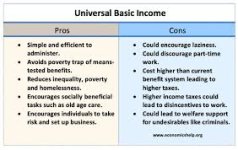In an era marked by rapid technological advancement, economic uncertainty, and growing income inequality, the idea of a Universal Basic Income (UBI) has gained significant traction. The concept is simple: every citizen, regardless of employment status, receives a set amount of money from the government. But should we implement it on a global scale? The debate surrounding UBI is multifaceted and complex, stirring strong opinions on both sides.
Supporters of UBI argue that it is a revolutionary solution to the challenges of automation and job displacement. With machines taking over repetitive tasks and artificial intelligence pushing boundaries in nearly every industry, many fear the loss of traditional jobs. A UBI would provide a safety net for those displaced by technology, ensuring no one is left behind. It would empower individuals to pursue education, entrepreneurial ventures, or creative endeavors without the constant worry of financial ruin.
Furthermore, proponents argue that UBI would simplify welfare systems. Instead of complex, bureaucratic programs designed to address poverty, unemployment, and healthcare, a universal payment could reduce administrative costs and provide direct relief. It could also tackle issues of inequality, ensuring that even the most marginalized communities receive basic financial support. For those living paycheck to paycheck, a UBI could provide the financial freedom to make choices that improve their lives without fear of financial instability.
On the other hand, critics argue that UBI is economically unsustainable. Funding such a program would require massive increases in taxes or government debt, and many worry that this could stifle economic growth and innovation. Additionally, some believe that UBI could disincentivize work, leading to a less productive society where people depend on government handouts rather than pursuing employment or contributing to the economy. Critics also question whether UBI would be the best use of government resources when other pressing issues, such as climate change, education, and healthcare, require urgent attention.
Despite these concerns, several countries have experimented with UBI on a small scale, and the results have been mixed but encouraging. Some pilots have shown positive impacts on mental health, work-life balance, and even employment rates. As society continues to evolve, the debate around UBI is only likely to intensify.
In conclusion, while a Universal Basic Income may not be the perfect solution, it undoubtedly opens a critical conversation about the future of work, technology, and economic stability. Is it time for a change in the way we think about income? Only time will tell.
Supporters of UBI argue that it is a revolutionary solution to the challenges of automation and job displacement. With machines taking over repetitive tasks and artificial intelligence pushing boundaries in nearly every industry, many fear the loss of traditional jobs. A UBI would provide a safety net for those displaced by technology, ensuring no one is left behind. It would empower individuals to pursue education, entrepreneurial ventures, or creative endeavors without the constant worry of financial ruin.
Furthermore, proponents argue that UBI would simplify welfare systems. Instead of complex, bureaucratic programs designed to address poverty, unemployment, and healthcare, a universal payment could reduce administrative costs and provide direct relief. It could also tackle issues of inequality, ensuring that even the most marginalized communities receive basic financial support. For those living paycheck to paycheck, a UBI could provide the financial freedom to make choices that improve their lives without fear of financial instability.
On the other hand, critics argue that UBI is economically unsustainable. Funding such a program would require massive increases in taxes or government debt, and many worry that this could stifle economic growth and innovation. Additionally, some believe that UBI could disincentivize work, leading to a less productive society where people depend on government handouts rather than pursuing employment or contributing to the economy. Critics also question whether UBI would be the best use of government resources when other pressing issues, such as climate change, education, and healthcare, require urgent attention.
Despite these concerns, several countries have experimented with UBI on a small scale, and the results have been mixed but encouraging. Some pilots have shown positive impacts on mental health, work-life balance, and even employment rates. As society continues to evolve, the debate around UBI is only likely to intensify.
In conclusion, while a Universal Basic Income may not be the perfect solution, it undoubtedly opens a critical conversation about the future of work, technology, and economic stability. Is it time for a change in the way we think about income? Only time will tell.

